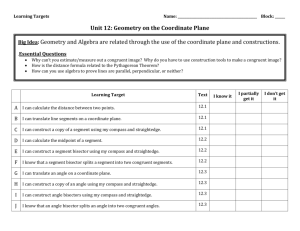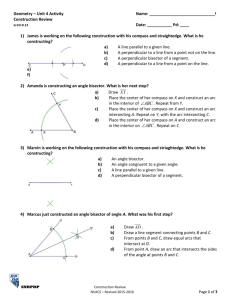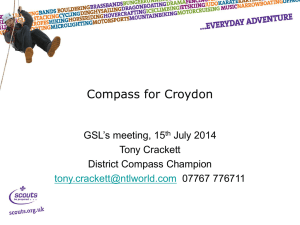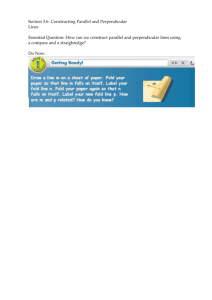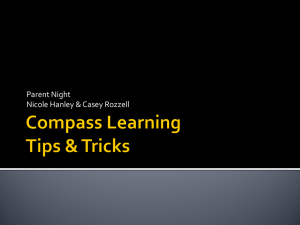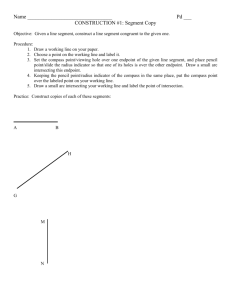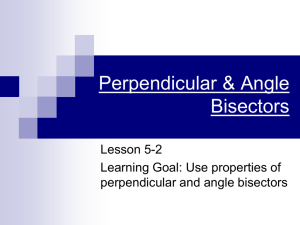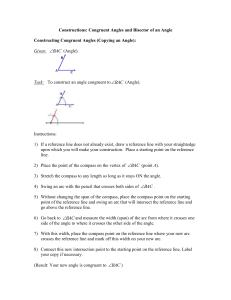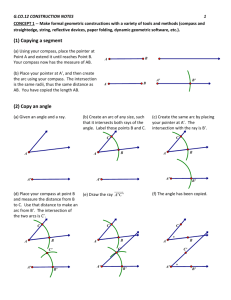Q1_U1_W3_G_BasicC
advertisement
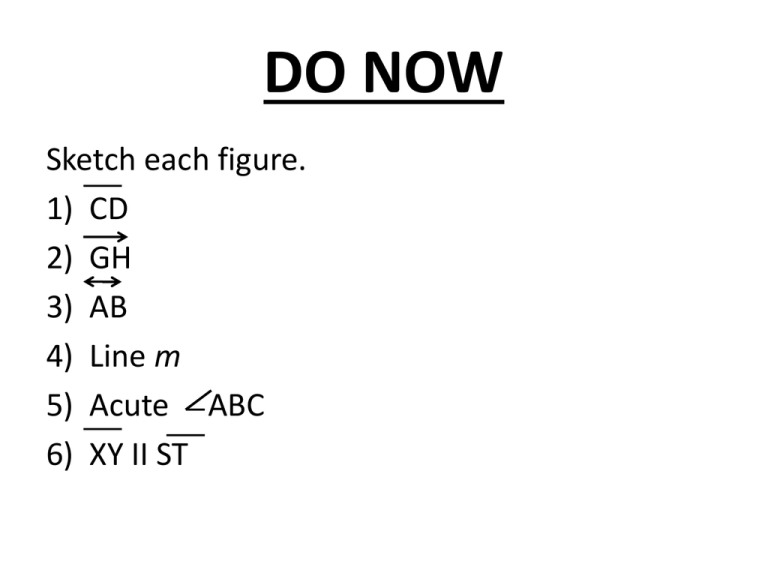
DO NOW Sketch each figure. 1) CD 2) GH 3) AB 4) Line m 5) Acute ABC 6) XY II ST Basic Constructions Geometry Week 3 of 9 Unit 1: Logic & Reasoning 9/9 & 9/10 Standards & Objective Standard 16.0 Students perform basic constructions with a straightedge and compass, such as angle bisectors and perpendicular bisectors. Objective: • Use a compass and a straightedge to construct congruent segments and congruent angles • Use a compass and a straightedge to bisect segments and angles Example: Constructing Congruent Segments Construct a segment congruent to a given segment Given: AB Construct: CD so that CD = AB Step 1: Draw a ray with endpoint C Step 2: Open the compass to the length of AB Step 3: With the same compass setting, put the compass point on point C. Draw an arc that intersects the ray. Label the point of intersection D. Practice: Constructing Congruent Segments 1. Construct XY congruent to AB. 2. Construct VW so that VW = 2AB A● ●B 2 inches Example: Constructing Congruent Angles Construct an angle congruent to a given angle. Given: A Construct: S so that S = A Step 1: Draw a ray with endpoint S Step 2: With the compass point on point A, draw an arc that intersects the sides of A. Label the points of intersection B and C. Step 3: With the same compass setting, put the compass point on point S. Draw an arc and label its point of intersection with the ray as R. Step 4: Open the compass to the length BC. Keeping the same compass setting, put the compass point on R. Draw an arc to locate point T. Step 5: Draw ST Practice: Constructing Congruent Angles Construct D so that D = C C Constructing the Perpendicular Bisector Construct the perpendicular bisector of a segment. Given: AB Construct: XY so that XY AB at the midpoint M of AB Step 1: Put the compass point on point A and draw a long arc as shown. Be sure the opening is greater than ⅟2 AB. Step 2: With the same compass setting, put the compass point on point B and draw another long arc. Label the points where the two arcs intersect as X and Y. Step 3: Draw XY. The point of intersection of AB and XY is M, the midpoint of AB. XY AB at the midpoint of AB, so that XY is the perpendicular bisector of AB. Draw ST. Construct its perpendicular bisector. Practice: Constructing the Perpendicular Bisector Construct the perpendicular bisector of AB ● A ● B Finding Angle Measures Angle Bisector: a ray that divides an angle into two congruent angles. KN bisects JKL so that m JKN = 5x25 and m NKL = 3x+5. Solve for x and find m JKN. m JKN = m NKL 5x – 25 = 3x + 5 5x = 3x + 30 2x = 30 X = 15 m JKN = 5x – 25 = 5(15) – 25 = 50 m JKN = 50 Definition of Angle Bisector Substitute Add 25 to each side Subtract 3x from each side Divide each side by 2 Substitute 15 for x Practice: Finding Angle Measures GH bisects FGI. a) Solve for x b) Find m HGI c) Find m FGI F H (4x – 14) G I Constructing the Angle Bisector Construct the bisector of an angle Given: A Construct: AX, the bisector of A Step 1: Put the compass point on vertex A. Draw an arc that intersects the sides of A. Label the points of intersection B and C. Step 2: Put the compass point on point C and draw an arc. With the same compass setting, draw an arc using point B. Be sure the arcs intersect. Label the point where the two arcs intersect as X. Step 3: Draw AX. AX is the bisector of CAB.
